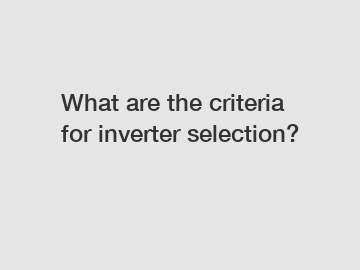What are the criteria for inverter selection?
What are the criteria for inverter selection?
Inverters play a crucial role in many electronic systems, converting direct current (DC) to alternating current (AC). They are widely used in various applications including solar power systems, electric vehicles, and backup power systems. However, with the wide range of inverters available in the market, choosing the right one for your specific needs can be a daunting task. To help you make an informed decision, here are the key criteria to consider when selecting an inverter.
1. Power Output and Efficiency.

The first criteria to consider when selecting an inverter is its power output and efficiency. The power output of the inverter should be compatible with your load requirements. It should be able to handle the maximum power demand of your system without any issues. Additionally, a high-efficiency inverter will help maximize the conversion of DC power to AC power, saving energy and reducing operating costs.
2. Input Voltage and PV Array Compatibility.
If you are considering an inverter for a solar power system, it is essential to ensure that the inverter is compatible with the input voltage of your photovoltaic (PV) array. Different PV arrays come with different voltage outputs, and selecting an inverter that matches your PV array requirements is critical for optimal performance.
3. Grid-tied or Off-grid.
Determining whether you require a grid-tied or off-grid inverter is another important criterion. Grid-tied inverters are designed to feed excess power generated by your system back into the electrical grid, allowing you to earn credits or receive payments for the power you generate. On the other hand, off-grid inverters are used in standalone systems that are not connected to the grid, such as remote cabins or isolated areas. Understanding the specific requirements of your system will help you select the most suitable inverter type.
4. Surge Capability and Overload Protection.
To ensure the longevity and reliability of your electronic devices, it is crucial to select an inverter with a surge capability and overload protection. These features safeguard your equipment from voltage spikes and power surges, which are common occurrences in some electrical systems. Surge capability allows the inverter to handle sudden high peaks in power demand, while overload protection prevents damage caused by excessive loading.
5. Monitoring and Connectivity Features.
With advancements in technology, inverters now come with monitoring and connectivity features that provide valuable information about the performance of your system. Some inverters offer real-time data monitoring, enabling you to track the energy production, efficiency, and other parameters. Additionally, connectivity features such as Wi-Fi or Bluetooth allow you to easily access and analyze the data from your inverter using a smartphone or computer.
In conclusion, selecting the right inverter for your specific needs requires careful consideration of several criteria. These include power output and efficiency, input voltage and PV array compatibility, whether a grid-tied or off-grid inverter is required, surge capability and overload protection, as well as monitoring and connectivity features. By evaluating these criteria and understanding your system's requirements, you can make an informed decision when choosing an inverter.
For professional guidance and expert advice on inverter selection, please do not hesitate to contact us. Our team of experienced professionals is ready to assist you in making the best choice for your specific requirements. Don't wait, contact us today!
Keywords: contact us.
If you are looking for more details, kindly visit Compatibility of lithium storage battery with inverters, high voltage lithuim battery price, single phase string inverter price.


